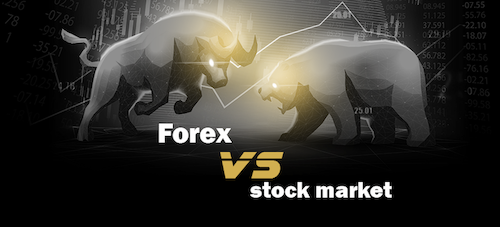
Forex and stocks are two of the most popular global markets. Before you start trading either, it's vital to know which is best suited for your trading strategy and risk appetite. Look at our comparison and learn the differences. Both have large numbers of historical transactions, volatility, and educational resources. However, a traders choice of the market is dependent on their personality, experience level, and preferred trade pace.
Generally speaking, forex tends to appeal more to those who prefer to make quick trades over short periods. What is Forex Trading? Forex is a liquid market with many buyers and sellers, so many profit opportunities exist. The stock market typically appeals more to investors with a longer-term strategy in mind. The process of buying shares can take longer as it involves more steps than in trading forex.
Forex Market Versus Stock Market; Overview
The largest difference between forex and the stock market is, of course, what you are trading. Forex, or foreign exchange, is a marketplace for the buying and selling of currencies, while the stock market deals in shares – the units of ownership in a company. Primarily, your decision about whether to trade currencies or stocks should be based on which asset you are interested in trading, but there are some other factors you need to consider.
The Foreign Exchange market, also called FOREX or FX, is the global market for currency trading. In its simplest form, forex is a game of speculating on currency exchange rates. If you want to start trading Forex, check out this guide for forex trading beginners.
For example, if you think that the dollar will fall against another currency (say the Canadian dollar) over the next three months, you can go short the Canadian dollar and make a profit. Or, if you think that the Canadian dollar will rise against another currency (the U.S. dollar), you can go long on the Canadian dollar and make money. It is important to know the difference between Forex VS Stock Market.
Stock trading is also about predicting what will happen to the market values over time — but with stocks instead of currencies. Traders buy stocks expecting that theyll increase in value over time — assuming nothing bad happens like a corporate earnings miss or other adverse news items.
To buy a stock means to own a piece of a company. To sell a stock means you no longer own that piece. When you trade on a CFDs platform, you own a contract for difference, not a real stock.
Difference Between The Forex And The Stock Market
Trading Hours: The opening hours of a market can have a significant influence over your trading, impacting the time you will need to spend monitoring the markets.
As forex is a completely global market, you can trade 24 hours a day, five days a week. This provides you with ample opportunities for trading, but also creates the risk of the market moving while you aren‘t around to monitor it. If you decide to trade forex, it is important to create a risk management strategy with appropriate stops and limits to protect your trades from unnecessary losses. The stock market is available only on weekdays from 9:30 am to 4 pm EST, while the forex market is open 24 hours a day for five days a week. However, it’s not always active during these 24 hours because there are four significant sessions where most of the trading occurs.
Accessibility: The forex market is far more accessible than the stock market because theres generally no minimum amount required to open an account. You can even open a micro account for less than $100. In the stock market, registration requirements dictate that you must register with a brokerage firm and open an account with a minimum of $25,000. You can trade stocks on margin with a margin account if extra funds are deposited into your account.
Liquidity
Liquidity is the ease at which an asset can be bought or sold in a market. It is an important consideration because the higher the volume of traders, the more money there is flowing through the market at any time – making it easier for you to find someone to take the other side of your position.
Forex is the largest and most popular financial market in the world, which means it is extremely liquid and frequently sees a daily turnover of trillions of dollars.
Market liquidity can fluctuate throughout the day as different sessions open and close around the world, but it also varies greatly depending on which FX pair you choose to trade. Just eight currency pairs account for the majority of trading volume – for example, the dollar is involved in almost 75% of all forex trades according to the Bank of International Settlements (2016).
The stock market sees comparatively fewer trades per day, but shares are still easy to access and trade. Large, popular stocks – such as Apple, Microsoft or Facebook – are the most liquid as there are usually willing buyers and sellers, but once you move away from blue chips there is often significantly less liquidity.
Leverage
Trading on leverage enables you to gain exposure to markets with just a fraction of the capital normally required. Leveraged products, such as CFDs, can be used to trade on margin across a range of markets.
Though it can be an advantage of both share trading and forex trading alike, it is more commonly cited as a feature of currency trading. Forex trades usually have a much larger leverage ratio, in some countries as much as 200:1. But leverage is a double-edged sword: though it can magnify returns, it can also magnify losses.
Whichever market you choose, it is important to be aware of the size of your exposure, and understand the risks involved.
Leave a Reply